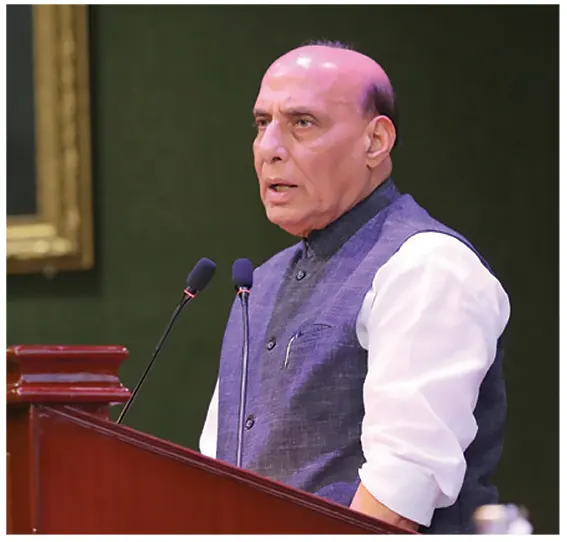
NEW DELHI, 11 Sep: Defence minister Rajnath Singh reaffirmed the Centre’s commitment to the holistic development of border villages, describing them as the country’s first villages, and not remote areas.
Addressing the Border Area Development Conclave here on Wednesday, Singh pointed out that India’s geo-strategic position is such that it is exposed to different kinds of challenges and the best way to deal with them is to ensure border area development.
Highlighting the progress achieved in border area development in the last 10 years, Singh said: “BRO has constructed over 8,500 kms of roads and more than 400 permanent bridges.”
He said that the transmission and distribution infrastructure of north-eastern states is being strengthened. High-speed internet has been provided to over 1,500 villages through the Bharat-Net broadband project. In the last four years alone, more than 7,000 border villages have been connected with internet connection, and centre’s focus has been Ladakh and Arunachal Pradesh.
Singh emphasised that promoting tourism in border areas is being given special emphasis by the government as it acts as a catalyst for the development of the region.
“Tourism has immense potential in border areas, but it could not reach the desired heights due to lack of infrastructure. Things have changed since this Government came to power. We are working towards development in these areas. From 2020 to 2023, the footfall of tourists in Ladakh, Sikkim and Arunachal Pradesh increased by 30%.”
He threw light on ‘reverse migration,’ which he termed as one of the positive outcomes of economic development in border areas. He made special mention of Huri village in Arunachal Pradesh, a unique example of development through civil-military collaboration. He stated that while the central and state governments focused on economic progress, BRO & Indian army laid emphasis on infrastructure development, which resulted in reverse migration.
Speaking about the Vibrant Village programme which aims to highlight the possibilities of border villages and ensure their development, the minister said: “Our objective is to transform the villages along the Northern borders especially, in Uttarakhand, Himachal Pradesh and Arunachal Pradesh, which are suffering from limited connectivity and infrastructure, into a Model Village.”
“We aim to connect them to the mainstream of development,” he said.
Chief Minister Pema Khandu appreciated the Vibrant Villages programme, which has transformed the border areas of the state by providing sustained development.
Khandu highlighted the strides made in improving infrastructure across the state’s 11 border districts and 29 border blocks. He noted that while development in these areas was once a challenge, today major towns are well-connected, including those in remote border regions.
He also highlighted the success of the Vibrant Village programme, noting the transformative changes it has brought.
“Ongoing projects include the construction of 1,022 km of roads to connect 124 habitations. Under the first phase of development, works are ongoing in 455 habitations, with infrastructure improvements currently underway in 156 villages,” he said.
Khandu expressed his gratitude to the Indian army for its significant contributions to the region, particularly, through Operation Sadbhavna and Project Samaritan, which have facilitated development in areas such as education and healthcare. He urged the Raksha Mantri to continue supporting such vital programs.
The Chief Minister also spoke about efforts in Arunachal Pradesh to ensure synchronized planning between the defense forces, central armed police forces, and state representatives. This planning, he said, aligns with both national security interests and rural developmental needs.
Tourism was a key focus of Khandu’s speech, where he noted the potential for developing the rural economy through collaborative efforts with the Indian army to promote sustainable development in border areas.
“Tourism must reach the borders, and we are committed to ensuring that local communities benefit from this growth. Sustainable development will provide a source of income for the people, and the Army can play a crucial role as a development partner,” CM Khandu stated.
The conclave aimed to foster collaboration and unlock the full potential of India’s border regions, ensuring both development and national security go hand in hand.
It was organised jointly by the Indian army, in collaboration with Centre for Land Warfare Studies, ministries of defence, tourism, home affairs, education, telecommunications and the government of Arunachal Pradesh. (PIB/CM’s PR cell)



